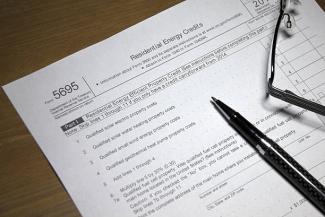
The Expiring Tax Credits for Energy-Efficient Residential Improvements and Electric Vehicles: What You Need to Know
As homeowners increasingly look for ways to reduce their environmental footprint and save money on utility bills, energy-efficient home improvements have gained popularity. One of the biggest incentives for these upgrades has been federal tax credits designed to ease the upfront costs. However, many of these tax credits are set to expire soon, and homeowners who haven’t yet taken advantage of them may be leaving money on the table.
In this article, we will break down the current state of tax credits for energy-efficient residential improvements, how homeowners can take advantage of them, and the potential impact of their expiration.
What Are Energy-Efficient Tax Credits?
Energy-efficient tax credits are financial incentives provided by the federal government to encourage homeowners to invest in energy-saving upgrades. These credits reduce the amount of taxes owed, essentially lowering the cost of implementing energy-efficient improvements. The types of home improvements eligible for tax credits vary, but common examples include:
- Solar Panels: Residential solar energy systems
- Heat Pumps: Energy-efficient heating and cooling systems
- Insulation and Air Sealing: Insulation improvements, including attic and wall insulation
- Windows and Doors: Energy-efficient windows and doors
- Electric Vehicles (EV) Chargers: Installation of home EV charging stations
- Energy-Efficient Appliances: Eligible products include dishwashers, water heaters, and more
These credits were introduced to promote sustainability, reduce overall energy consumption, and lower homeowners' environmental impact. However, several of these credits are time-sensitive, with some set to expire at the end of 2025 unless extended.
The Expiring Tax Credits
As of now, many popular energy-efficient tax credits are scheduled to expire soon. Homeowners should be aware of these deadlines to maximize the available savings. Below are some of the key expiring credits:
- Residential Clean Energy Credit (Solar and Wind)
- Expiration Date: December 31, 2025
- Details: The federal government has extended the solar tax credit, known as the Investment Tax Credit (ITC), for solar panel systems and other renewable energy projects like wind turbines. Homeowners can claim a percentage of the cost of installation, with the credit reducing from 30% in 2022 to 22% in 2023. The credit is scheduled to drop to 0% after 2025 unless extended by Congress.
- Energy-Efficient Home Improvement Credit
- Expiration Date: December 31, 2025
- Details: Homeowners who invest in energy-efficient upgrades such as insulation, energy-efficient doors and windows, or energy-saving HVAC systems may qualify for a credit up to $500. These improvements help reduce energy bills and enhance home comfort.
- Electric Vehicle (EV) Charger Tax Credit
- Expiration Date: June 30, 2026
- Details: The EV charger tax credit allows homeowners to claim a percentage of the cost for installing a home EV charger. While this incentive has been available for some time, it’s worth noting that it is tied to electric vehicle adoption, and tax credits for this infrastructure are particularly important with the rise of electric car ownership.
- High-Efficiency Heating, Ventilation, and Air Conditioning (HVAC) Systems
- Expiration Date: December 31, 2025
- Details: Certain high-efficiency HVAC systems, such as heat pumps and geothermal systems, are eligible for a federal tax credit. Homeowners can claim up to $300 for qualifying systems, reducing the overall installation costs.
How Homeowners Can Take Advantage of Expiring Tax Credits
Homeowners should act swiftly if they intend to benefit from the available tax credits before they expire. Here’s how you can make the most of these incentives:
- Plan Your Upgrades
If you’ve been considering making energy-efficient improvements, now is the time to start planning. Prioritize projects that will offer the most savings, both in terms of the tax credit and the long-term reduction in energy costs. - Consult with Professionals
Energy-efficient upgrades often require professional installation to meet federal guidelines. Work with certified contractors and service providers to ensure your improvements qualify for the tax credits. - Keep Records
Proper documentation is essential to claim your credits. Save all invoices, receipts, and installation records. Additionally, make sure the products or systems you are installing meet the specific requirements for the tax credit, such as being Energy Star-certified. - Claim the Credits on Your Taxes
You’ll need to file IRS Form 5695 (Residential Energy Credits) when you file your taxes. The form is specifically designed to help homeowners claim energy-efficient improvement credits. Consider consulting with a tax professional to make sure you are claiming the credits correctly. - Act Before the Deadline
While some credits are scheduled to expire at the end of 2025, there’s a possibility that the government may extend these programs further. However, with no guarantees, it’s wise not to wait until the last minute. Please note, to qualify for the tax credit the item(s) must be installed on or before December 31, 2025.
The Electric Vehicle Tax Credit is Also Expiring
The Electric Vehicle (EV) tax credit for purchasing a new electric vehicle expires on September 30, 2025, which could have significant implications for prospective EV buyers. Currently, this credit provides up to $7,500 off the purchase price of a new EV, making the shift to electric vehicles more affordable for consumers. However, the credit is set to gradually phase out after 2025, which means that buyers who are waiting to make the switch to an EV should consider doing so sooner to take full advantage of the savings. As with the EV charging station credit, there is always the possibility of Congress extending or modifying the program, but for now, the expiration is a critical deadline for anyone hoping to benefit from this substantial incentive.
Conclusion
Energy-efficient tax credits have made it more affordable for homeowners to invest in upgrades that benefit both their wallets and the environment. However, with several of these tax credits set to expire soon, homeowners must act fast if they want to take advantage of them.
Whether you are installing solar panels, upgrading to an energy-efficient HVAC system, or adding insulation, the financial incentives available through these credits are substantial. If you’re planning to make any energy-efficient improvements in your home, now is the time to do so.
As always, stay informed and consult with professionals to ensure that your upgrades qualify for tax credits. By doing so, you can save money and contribute to a more sustainable future—before these incentives are gone.

